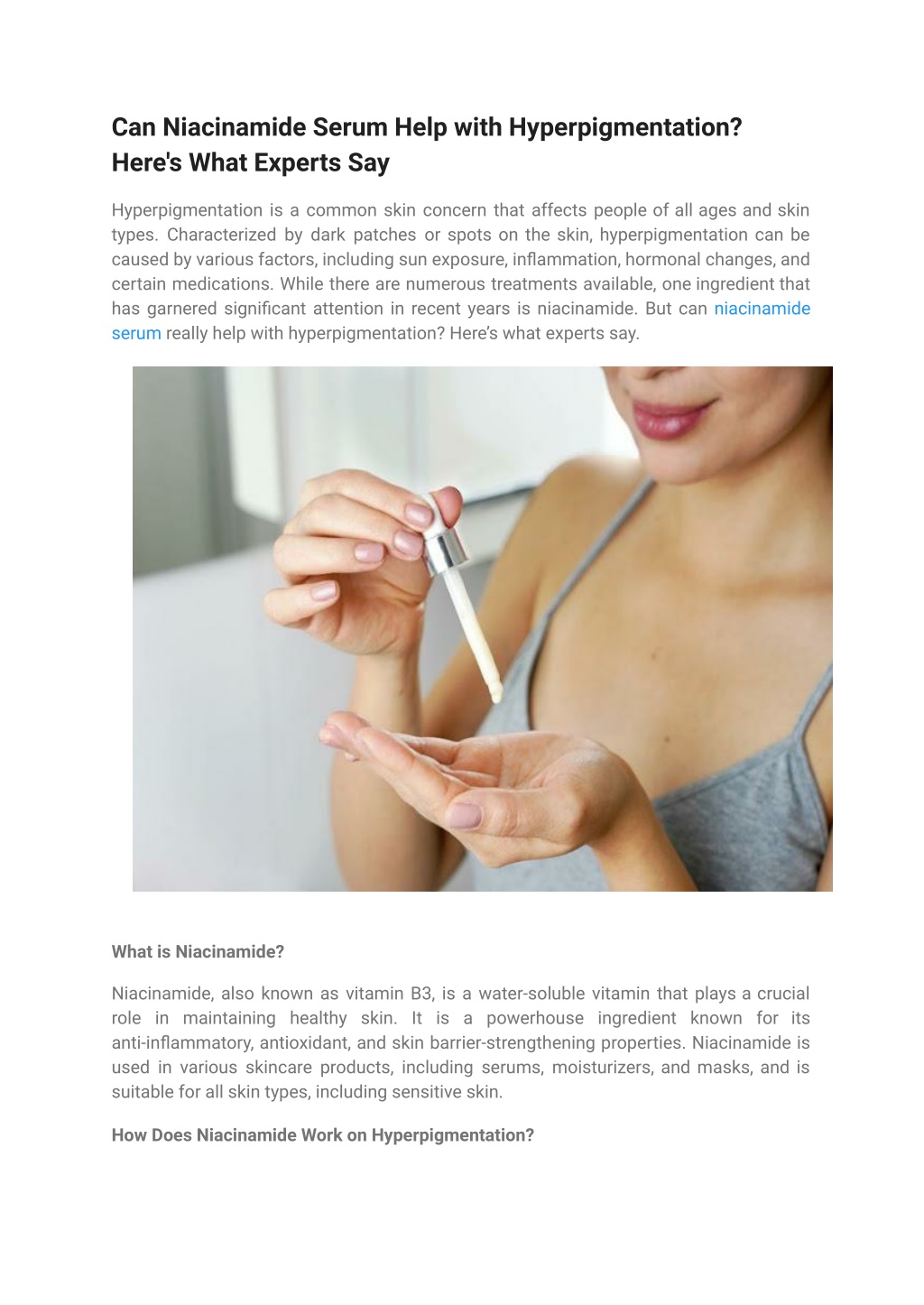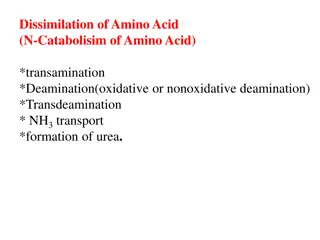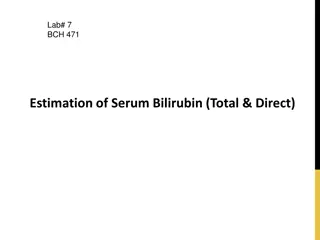
Can Niacinamide Serum Help with Hyperpigmentation Here's What Experts Say
Hyperpigmentation is a common skin concern that affects people of all ages and skin types. Characterized by dark patches or spots on the skin, hyperpigmentation can be caused by various factors, including sun exposure, inflammation, hormonal changes,
Download Presentation

Please find below an Image/Link to download the presentation.
The content on the website is provided AS IS for your information and personal use only. It may not be sold, licensed, or shared on other websites without obtaining consent from the author. Download presentation by click this link. If you encounter any issues during the download, it is possible that the publisher has removed the file from their server.
E N D
Presentation Transcript
Can Niacinamide Serum Help with Hyperpigmentation? Here's What Experts Say Hyperpigmentation is a common skin concern that affects people of all ages and skin types. Characterized by dark patches or spots on the skin, hyperpigmentation can be caused by various factors, including sun exposure, inflammation, hormonal changes, and certain medications. While there are numerous treatments available, one ingredient that has garnered significant attention in recent years is niacinamide. But can niacinamide serum really help with hyperpigmentation? Here s what experts say. What is Niacinamide? Niacinamide, also known as vitamin B3, is a water-soluble vitamin that plays a crucial role in maintaining healthy skin. It is a powerhouse ingredient known for its anti-inflammatory, antioxidant, and skin barrier-strengthening properties. Niacinamide is used in various skincare products, including serums, moisturizers, and masks, and is suitable for all skin types, including sensitive skin. How Does Niacinamide Work on Hyperpigmentation?
Hyperpigmentation occurs when an excess of melanin, the pigment responsible for skin color, is produced. This can lead to uneven skin tone and dark spots. Niacinamide helps address hyperpigmentation in several ways: 1. Inhibits Melanin Transfer: Niacinamide has been shown to inhibit the transfer of melanin from melanocytes (the cells that produce melanin) to keratinocytes (the cells on the surface of the skin). This process helps reduce the appearance of dark spots and promotes a more even skin tone. 2. Anti-inflammatory Properties: Inflammation can trigger hyperpigmentation, particularly in conditions like acne. Niacinamide s anti-inflammatory properties help soothe the skin and reduce the risk of post-inflammatory hyperpigmentation (PIH). 3. Antioxidant Protection: Niacinamide acts as an antioxidant, protecting the skin from oxidative stress caused by environmental factors like UV radiation and pollution. By reducing oxidative damage, niacinamide helps prevent the formation of new dark spots. 4. Improves Skin Barrier Function: A healthy skin barrier is essential for maintaining an even skin tone. Niacinamide strengthens the skin barrier, enhancing its ability to retain moisture and protect against external aggressors that can contribute to hyperpigmentation. What Do the Experts Say? Dermatologists and skincare experts widely recognize the benefits of niacinamide for treating hyperpigmentation. Dr. Shari Marchbein, a board-certified dermatologist, explains, Niacinamide is a fantastic ingredient for those dealing with hyperpigmentation because it not only helps to lighten dark spots but also improves the overall texture and tone of the skin. Dr. Joshua Zeichner, Director of Cosmetic and Clinical Research in Dermatology at Mount Sinai Hospital, adds, Niacinamide is a versatile ingredient that can be used by people with all skin types. It s especially beneficial for those with sensitive skin who might not tolerate other brightening agents like hydroquinone or retinoids. Studies have also supported these expert opinions. A study published in the Journal of Cosmetic and Laser Therapy found that a topical application of niacinamide significantly reduced hyperpigmentation and improved skin texture over a period of 4 to 8 weeks. How to Incorporate Niacinamide Serum into Your Skincare Routine
Incorporating niacinamide serum into your skincare routine is simple and can yield noticeable results. Here s a step-by-step guide to help you get started: 1. Cleanse: Begin with a gentle cleanser to remove impurities and prepare your skin for the serum. 2. Apply Niacinamide Serum: After cleansing, apply a few drops of niacinamide serum to your face and neck. Gently pat the serum into your skin until fully absorbed. Niacinamide can be used both in the morning and evening. 3. Moisturize: Follow up with a moisturizer to lock in hydration and strengthen your skin barrier. 4. Sun Protection: In the morning, apply a broad-spectrum sunscreen with at least SPF 30. Sun protection is crucial when treating hyperpigmentation, as UV exposure can worsen dark spots. Combining Niacinamide with Other Ingredients Niacinamide is a versatile ingredient that works well with other skincare ingredients. Here are some combinations that can hyperpigmentation: enhance its effectiveness against 1. Niacinamide + Vitamin C: Combining niacinamide with vitamin C can provide a powerful antioxidant boost and enhance the brightening effects. While some believe that these two ingredients shouldn t be used together, recent research suggests they can be effective when formulated correctly. 2. Niacinamide + Retinol: Retinol is another potent ingredient for treating hyperpigmentation. Using niacinamide alongside retinol can help minimize irritation and enhance the overall benefits for a clearer, more even complexion.
3. Niacinamide + Hyaluronic Acid: Hyaluronic acid is a hydrating ingredient that can enhance the moisture-retaining properties of niacinamide, making it an excellent combination for maintaining a healthy skin barrier and reducing hyperpigmentation. Choosing the Right Niacinamide Serum When selecting a niacinamide serum, consider the following factors: 1. Concentration: Niacinamide serums typically range from 2% to 10% concentration. For beginners, starting with a lower concentration (around 5%) can help minimize the risk of irritation. 2. Formulation: Look for a serum that contains complementary ingredients, such as hyaluronic acid, to enhance hydration and overall skin health. 3. Brand Reputation: Choose products from reputable brands that prioritize quality and safety. Reading reviews and checking for dermatologist endorsements can also help in making an informed decision. Potential Side Effects and Precautions Niacinamide is generally well-tolerated, but it s always important to patch test new products to ensure you don t have an adverse reaction. Apply a small amount of the serum to a discreet area of your skin and wait 24 hours to see if any irritation occurs. If you experience redness, itching, or swelling, discontinue use and consult a dermatologist. For those with sensitive skin, it s best to start with a lower concentration of niacinamide and gradually increase as your skin builds tolerance. Conclusion Niacinamide is a versatile and effective ingredient for treating hyperpigmentation. Its ability to inhibit melanin transfer, reduce inflammation, provide antioxidant protection,
and improve skin barrier function makes it a valuable addition to any skincare routine. With consistent use, niacinamide serum can help achieve a brighter, more even complexion. For those struggling with hyperpigmentation, incorporating a niacinamide serum could be a game-changer. Always remember to combine it with a good sunscreen to protect your skin from further damage and enhance the serum s effectiveness. For high-quality skincare products, including those featuring potent ingredients like niacinamide, visit AccuFix Cosmetics. Your journey to clearer, brighter skin starts here.















































